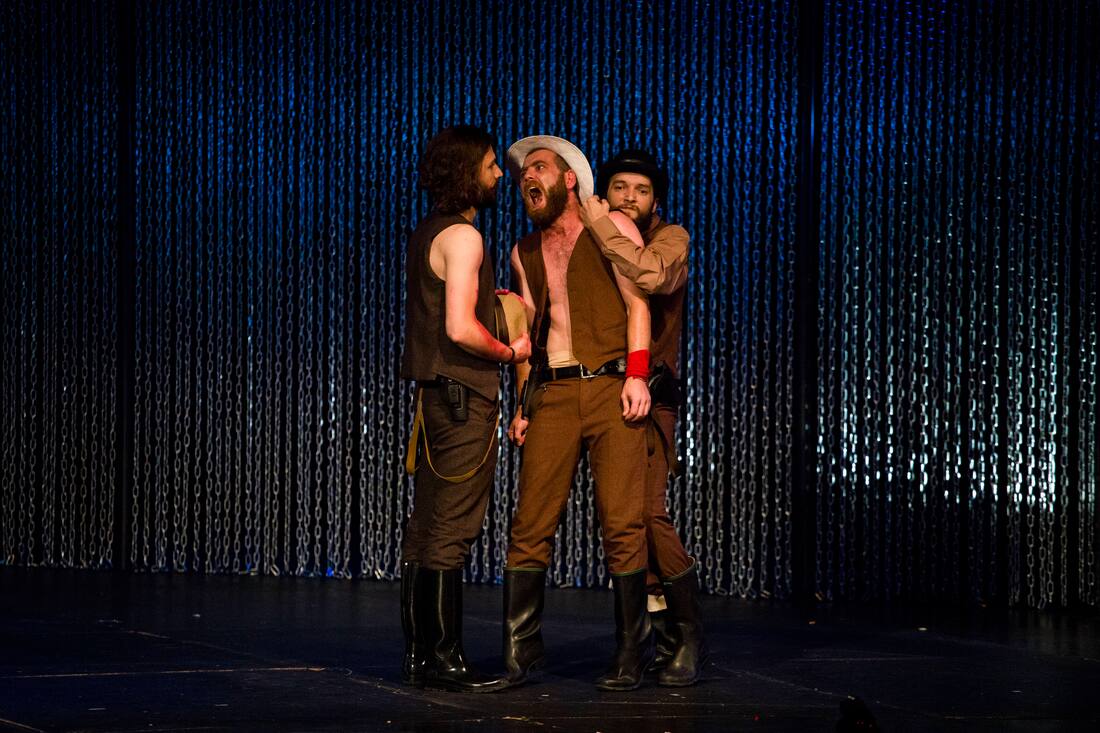 Arturo Ui, National Theatre of Kosovo Tringë Arifi Violence in the city. Violence in the people. This is the plan of gangster Arturo Ui, who in addition to a character in a play by Bertolt Brecht, is a character of our times, our politicians and those who govern us. Emptiness and decay manifest themselves in a moment when things do not go as expected by Arturo and his gang, slowly emerging into chaos. There is a lot of symbolism in the production, the last to be directed by the late Bekim Lumi. A scene in a bathroom, in which men sit on the toilet bowl sipping espresso, symbolises their comfort. This is followed by the complaints from the minority to the majority (the people) where they say `` why are they complaining`` ;`` why do you see crisis and why are the people not giving the cauliflower products while they are rotting? `` … They are sitting comfortably over the rot and misery they have created, trading in cauliflower then passing on complaints about not selling them. When some of his friends start to complain, to get out of that kind of comfort, Arturo's circle is narrowed further. The boss appears in the bathtub and two men scurry around him, then one comes and kills the other in front of Arturo - perhaps this scene shows the inferiority they have towards him, the will to commit more and more crimes to keep Arturo happy as he becomes the highest in the hierarchy of crime. After this macabre scene of murder disguised as suicide, the mafia talks about the corruption, while the old man appears as a business intermediary who is threatened. The whole scene is accompanied by music. Tom Waits' November is used in the face of crime, like Beethoven's 9th symphony with which the Nazis had committed crimes against humanity, and so they sing and dance like crazy people. As violence echoes across the city and humanity, Arturo devises another plan to destroy the courts in which the perpetrators are supposed to face justice. The culmination of the crime comes when his friends have become worried about Arturo as he comes second and kills the two friends who were in trouble for him. He is afraid of his own being. The old man addresses Arturo about the glory. He says that it is not won by force - and so the old man is also killed. Corpses appear in bathtubs. The first corpse is unveiled and resurrected. He rises and gives a speech: "You killed yourself when you killed me." Then the unconscious man begins to talk about violence, robbery and murder. He talks about the faith, about the will of the old man, the thanks he gave him in the will - though we do not see the will. When Arturo asks for votes on who is in his favour, he says those who are not in favour are necessarily against me. His only two remaining friends raise the hands of the dead from the grave as if they were voting, saying that everyone should be thankful. The irony is that only the two are alive and can vote, but his unjustifiable desire for power and crime makes them his two remaining friends lie and deceive him with votes, just as he likes to constantly lie to himself. Arturo appears again with an ironic speech about peace, protection of the city and trade, in which he says that no slander will stop him and he laughs like a madman. This laugh comes from not facing oneself, fear of oneself, a conclusion that drives him crazy. This is how the fate of a people ends and the scene closes without seeing the fate of this leader, but the being and the destruction towards this being are very well illustrated. The actors bring subtlety to their roles, an interiority is evident in every performance. Bujar Ahmeti, an actor of the new generation performs with the skill of a veteran. He takes the audience with him, walking us through the devilish mind of the character. Afrim Kasapolli, an actor of the older generation plays Dogsborough. He uses his interior a lot and masters the stage. The actors work well as an ensemble, as a team, clearly confident in the director and the concept. They fuse together. They become one. They evoke the passion, courage, and emotion of the characters, delicately drawing the relationships between the characters throughout the show. Author: Bertolt Brecht// Director: Bekim Lumi//Ass. director: Bashkim Ramadani // Cast: Bujar Ahmeti, Afrim Kasapolli, Afrim Mucaj, Labinot Raci, Faris Berisha, Valmir Krasniqi, Edon Shileku, Ismet Azemi, Ylber Bardhi, Kushtrim Qerimi, Shpetim Kastrati, Muhamed Arifi, Alban Rexhaj // Choreography: Majlajdo Gala // Music: Dren Suldashi // Stage Design: Mentor Berisha // Costumes: Alma Krasniqi // Tailor: Fadil Sahiti // Light Design: Mursel Bekteshi // Sound Design: Dren Suldashi, Avdi Gervalla // Stage Manager: Bajram Mehmetaj // Translation into Albanian: Robert Shvarc // Adaption into Gheg: Gazmend Berlajolli, Bekim Lumi // Organizer: Beqir Beqiri // Master Carpenter: Aziz Maloku // Carpenters: Rrahman Mehmeti, Hasan Buzaku, Fatmir Avdiu // Props: Xhemail Gllavica, Driton Musliu // Dressers: Fahredin Ahmeti, Linda Ahmeti // Make Up: Flori Hasani, Myrvete Tahiri
0 Comments
Leave a Reply. |
Kosovo Theatre ReviewsReviews and creative responses to theatre productions in Kosovo Archives
November 2022
Categories |
 RSS Feed
RSS Feed
